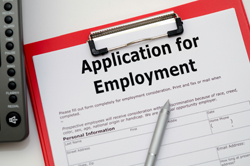The Best Questions to Ask at the End of a Job Interview
 During an interview there will almost inevitably come the time when the interviewer poses the inquiry, “So, do you have any questions?” This can be the point when normal interview nerves peak, while your mind starts to race through all of the information it has been presented with during the interview, searching for those magic questions that will make it evident that you are one of the most worthy candidates for the position. Being prepared for this moment by thinking through beforehand different options for suitable questions will help you to answer with confidence and make the best impression.
During an interview there will almost inevitably come the time when the interviewer poses the inquiry, “So, do you have any questions?” This can be the point when normal interview nerves peak, while your mind starts to race through all of the information it has been presented with during the interview, searching for those magic questions that will make it evident that you are one of the most worthy candidates for the position. Being prepared for this moment by thinking through beforehand different options for suitable questions will help you to answer with confidence and make the best impression.



 During the job-seeking process, it is crucial that candidates understand the importance of taking advantage of every opportunity available to them to show their value to the prospective employer. Writing a covering letter is an essential part of this process.
During the job-seeking process, it is crucial that candidates understand the importance of taking advantage of every opportunity available to them to show their value to the prospective employer. Writing a covering letter is an essential part of this process. The job-seeking process can be a nerve-wracking time for anyone. These nerves can be further exacerbated if you’ve had a recent interview with the company of your dreams and have yet to hear back from them. Stay positive; it is important to remember that the process of job seeking doesn’t necessarily end at the interview. When looking for a new job opportunity, you should keep in mind that each step of the recruitment process is a time to be proactive and maintain interaction with the employer. Remember that companies want to hire an individual who has an ongoing interest in the position, and is both passionate and forthcoming in their communication. Following up on a job interview can have extremely advantageous results. In fact, some companies have actually cited the candidate’s incentive to send them a follow-up as being the reason that they made the decision to hire that candidate.
The job-seeking process can be a nerve-wracking time for anyone. These nerves can be further exacerbated if you’ve had a recent interview with the company of your dreams and have yet to hear back from them. Stay positive; it is important to remember that the process of job seeking doesn’t necessarily end at the interview. When looking for a new job opportunity, you should keep in mind that each step of the recruitment process is a time to be proactive and maintain interaction with the employer. Remember that companies want to hire an individual who has an ongoing interest in the position, and is both passionate and forthcoming in their communication. Following up on a job interview can have extremely advantageous results. In fact, some companies have actually cited the candidate’s incentive to send them a follow-up as being the reason that they made the decision to hire that candidate. Career advancement is simple to achieve if you put your mind to it and have the right attitude. You need to make sure you stand out from the crowd and are recognised for your worth.
Career advancement is simple to achieve if you put your mind to it and have the right attitude. You need to make sure you stand out from the crowd and are recognised for your worth. ILSPA’s Legal Secretary Jobs Board
ILSPA’s Legal Secretary Jobs Board As we progress through the technological age, different elements of our daily lives progress with it. Procedures that were once traditional and mechanical have become modified, reconstructed and updated, and processes that took days, even weeks, can happen in a matter of seconds. The world of employment has not been immune to this evolution and continues to be significantly affected by the ongoing expansion of the modern age. It is important that we, as members of the 21st century, keep up to date with any changes in communication that may affect us so that we don’t miss any valuable opportunities. Professionals seeking employment, making connections, initiating introductions and carrying out referrals is nothing new in business. However, with the advent of social networking, the methods we use to make these connections has changed. LinkedIn is a website that is part of that change.
As we progress through the technological age, different elements of our daily lives progress with it. Procedures that were once traditional and mechanical have become modified, reconstructed and updated, and processes that took days, even weeks, can happen in a matter of seconds. The world of employment has not been immune to this evolution and continues to be significantly affected by the ongoing expansion of the modern age. It is important that we, as members of the 21st century, keep up to date with any changes in communication that may affect us so that we don’t miss any valuable opportunities. Professionals seeking employment, making connections, initiating introductions and carrying out referrals is nothing new in business. However, with the advent of social networking, the methods we use to make these connections has changed. LinkedIn is a website that is part of that change. Agile working is becoming more and more popular in many sectors, including the legal profession. But what is it, and how could you and your firm benefit?
Agile working is becoming more and more popular in many sectors, including the legal profession. But what is it, and how could you and your firm benefit? Imagine that you are an employer with one vacancy to fill and an array of hopeful candidates’ CVs. What attributes would a CV have to possess to separate it from the pile? What would intrigue you about a candidate enough for you to take the next step to invite them for an interview?
Imagine that you are an employer with one vacancy to fill and an array of hopeful candidates’ CVs. What attributes would a CV have to possess to separate it from the pile? What would intrigue you about a candidate enough for you to take the next step to invite them for an interview? Your first question might be – what is “employability”? Employability has been defined by the Confederation of Business and Industry as “a set of attributes, skills and knowledge that all employees should possess to ensure they have the capability of being effective in the workplace – to the benefit of themselves, their employer and the wider economy.” Put in simple terms, employability boils down to the knowledge, personal qualities, attitudes and behaviours you need to get a job, stay in that job and be successful in your work.
Your first question might be – what is “employability”? Employability has been defined by the Confederation of Business and Industry as “a set of attributes, skills and knowledge that all employees should possess to ensure they have the capability of being effective in the workplace – to the benefit of themselves, their employer and the wider economy.” Put in simple terms, employability boils down to the knowledge, personal qualities, attitudes and behaviours you need to get a job, stay in that job and be successful in your work.